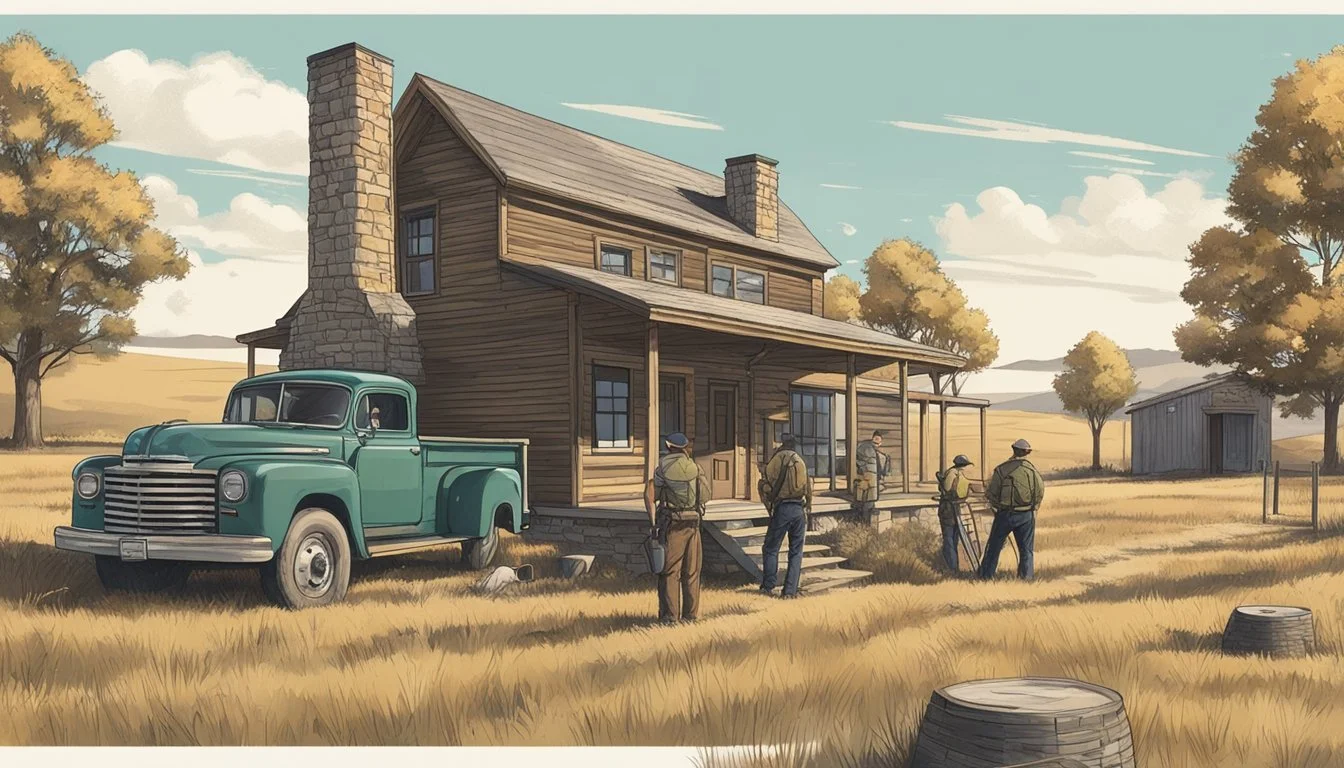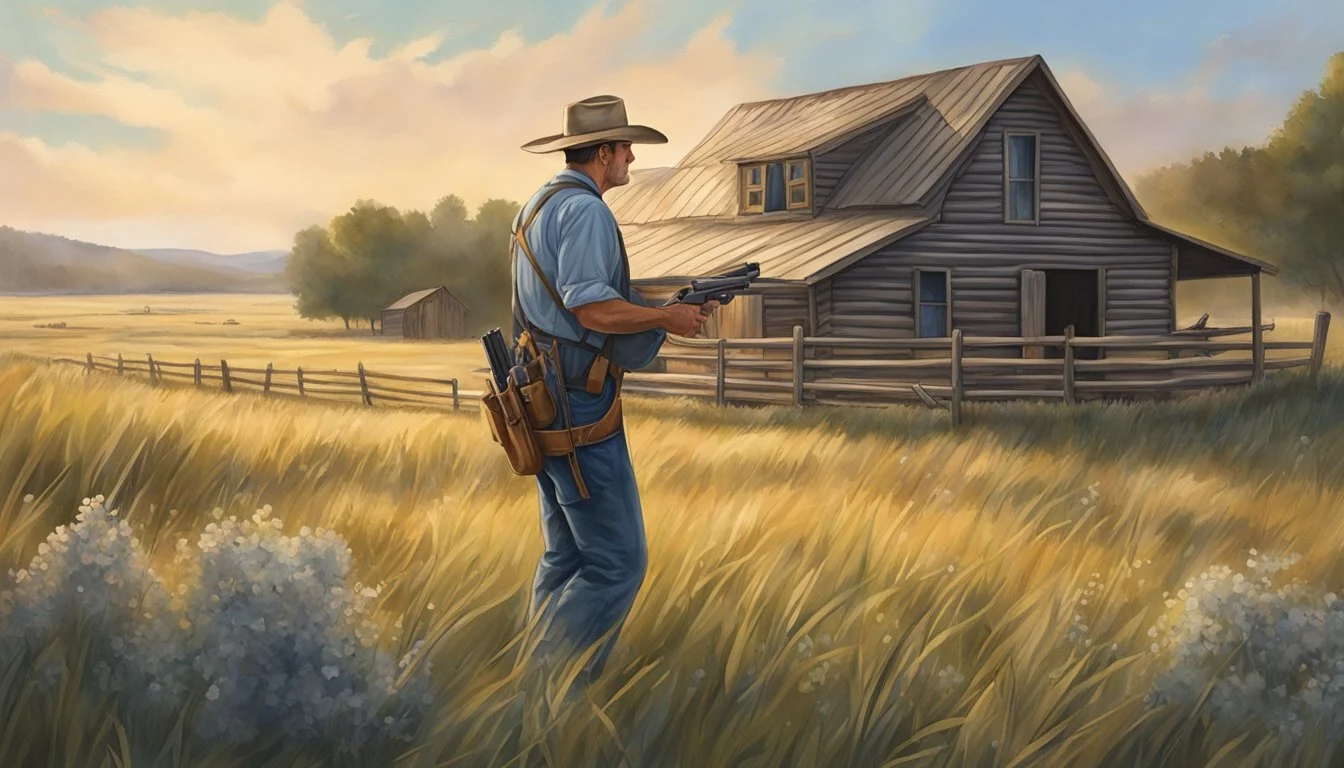Gun Laws in South Dakota for Homesteaders
Understanding Your Rights and Responsibilities
Homesteaders seeking a self-sufficient lifestyle in South Dakota will find gun ownership to be relatively straightforward due to the state's permissive firearms regulations. South Dakota upholds the fundamental right to bear arms for protection and hunting, pivotal aspects of rural homesteading life. Prospective and current homesteaders need to be aware of the state's laws regarding gun possession and the nuances that apply to them.
The state recognizes concealed carry permits from all jurisdictions, which simplifies the legal landscape for homesteaders who are already gun owners before moving to South Dakota. When purchasing firearms, homesteaders must comply with basic requirements such as being at least 21 years old, providing a state ID, and undergoing a background check by a licensed dealer. South Dakotan homesteaders with a concealed carry permit have the added convenience of bypassing the background check for gun purchases.
Furthermore, the state's gun laws are particularly hospitable to newcomers and residents alike, with permitless carry of both open and concealed firearms being legal since July 1, 2019. For homesteaders, this means that the right to carry a firearm on their land for protection, hunting, or other legal uses is recognized without the need for a separate carry permit. This aligns with the ethos of self-reliance that is an integral part of homesteading culture.
Overview of South Dakota Gun Laws
South Dakota stands as a state with minimal restrictions on gun ownership, allowing for both open carry and concealed carry without a permit for individuals who meet legal age requirements. The state's gun laws exhibit a strong support for the Second Amendment.
Legal Definitions and Categories of Firearms
In South Dakota, firearms are broadly categorized without a registration requirement. The categorization mainly distinguishes between handguns and long guns, where handguns include pistols and revolvers that are designed to be fired by the use of a single hand.
Permit and Licensing Requirements
Permitless Carry: South Dakota authorizes permitless carry for residents and non-residents, a policy that began on July 1, 2019. Anyone 18 or older can openly carry firearms without a permit.
Concealed Pistol Permit:
Standard Permit: While no permit is required to carry concealed for individuals 18 and over, South Dakota offers a "Shall Issue" standard concealed pistol permit. Applicants must pass a background check.
Enhanced Permit: An enhanced concealed carry permit is also available in South Dakota. It requires a background check as well as a firearms training course. This permit is recognized in some states that do not recognize the standard permit.
Eligibility and Application Process
The process of obtaining a concealed carry permit in South Dakota for homesteaders involves specific eligibility requirements followed by a detailed application procedure. Prospective applicants must pass a background check to ensure compliance with state and federal regulations.
Basic Eligibility Criteria
To be eligible for a concealed carry permit in South Dakota, applicants must satisfy the following conditions:
Residency: Must be a resident of South Dakota.
Age: At least 18 years old to apply.
Criminal History: No prior felony convictions.
Domestic Violence: Must not have been convicted of a crime involving domestic violence.
Mental Health: Not currently adjudged as mentally incompetent.
Application Procedure for Permits
Application steps include:
Locate Issuing Authority: Application begins with the local sheriff's department.
Submit Required Documentation: Applicants must provide identification and residency proof.
Fees: Payment of the required fee is essential to process the application.
Upon submission, applicants may receive a temporary permit, with the official permit issued following a successful background check.
Background Check Process
Initial Screening: The sheriff conducts an initial criminal background check.
NICS Check: As part of the background check, a National Instant Criminal Background Check (NICS check) is conducted to uncover any prohibiting factors.
Approval: If the applicant passes the background checks, and no disqualifying information is found, the sheriff will issue a temporary permit, pending state approval.
Successful applicants are granted the right to carry a concealed pistol, aligning with South Dakota’s regulations for responsible firearm ownership among homesteaders.
Concealed and Open Carry Regulations
In South Dakota, the regulations surrounding concealed and open carry are pivotal for homesteaders to understand. These laws determine how individuals can legally carry firearms on their person and property.
Concealed Carry Laws
South Dakota is a "shall issue" state for concealed carry permits, indicating that the sheriff of a county will issue a concealed carry permit if the applicant meets certain criteria. South Dakota residents and nonresidents who can legally possess a pistol are not mandated to have a permit to carry a concealed firearm. However, obtaining a South Dakota concealed carry permit can enhance reciprocity with other states and is necessary when carrying concealed in some licensed establishments.
Obtaining a Concealed Carry Permit:
Apply through the local sheriff's office.
Must be a resident of the county where applying.
Nonresident permits available under specific conditions.
Places Off-Limits Even With a Permit:
Courthouses
Elementary and secondary schools
Any establishment that derives over half of its sales from alcohol (signage required)
Open Carry Guidelines
Open carry of firearms is legal in South Dakota without the need for a state permit, emphasizing its permissive stance on gun laws. Individuals can carry openly in most public places, but some restrictions apply to certain firearms and locations.
Key Open Carry Points:
No permit is required to openly carry firearms.
Certain firearms, such as machine guns and semi-automatic weapons, have restrictions.
Devices like silencers are prohibited.
Municipality Restrictions and Vehicle Conditions:
Local municipalities can enact ordinances related to the discharge of firearms but cannot override state laws regarding the legality of open carry.
Firearms in vehicles must be visible unless the owner possesses a concealed carry permit.
Homesteaders should also be aware that the presence of firearms can affect interactions with law enforcement and should expect to inform officers if they are carrying a weapon.
Specific Locations and Restrictions
In South Dakota, homesteaders must be aware of specific legal frameworks concerning the areas where they may carry firearms and the accompanying restrictions. Understanding these legislations is crucial for responsible gun ownership and usage.
Firearm Possession in Vehicles
In South Dakota, individuals are permitted to have firearms in their vehicles. However, certain conditions apply:
Firearms must not be concealed without a proper permit.
Loaded firearms in vehicles are subject to restrictions, especially when traveling through school zones or on school premises.
Carrying Firearms on Private Property
Private property owners in South Dakota reserve the right to either permit or restrict firearm possession on their premises. Key points include:
Owners must explicitly communicate restrictions on firearm carrying.
Homesteaders who carry firearms without consent on private property may face trespassing charges.
Prohibited Places for Carrying Firearms
State law identifies several locations where carrying firearms is typically prohibited or restricted:
Courthouses: Firearms are not permitted within the premises of court facilities.
Schools: State law generally prohibits the possession of firearms on school grounds.
Establishments Serving Alcoholic Beverages: Firearms must not be carried into businesses that primarily serve alcohol.
Knowing these location-based restrictions is fundamental for all gun owners, ensuring compliance with state guidelines and safety within the community.
State Reciprocity and Gun Ownership
South Dakota's gun laws offer both reciprocity with several states and permitless carry for its residents. This makes the state an accessible environment for gun owners and homesteaders who value their Second Amendment rights.
Reciprocity with Other States
South Dakota acknowledges concealed carry permits from other states under certain conditions. The state's recognition extends to any out-of-state concealed carry permit as long as it was issued to a non-resident of South Dakota. Through this reciprocity agreement, permit holders from other states can legally carry concealed weapons in South Dakota, provided they comply with South Dakota's gun laws. Additionally:
The state issues Concealed Pistol Permits (CPP) for residents, military personnel, and their spouses stationed in South Dakota.
For carrying out-of-state, South Dakota's permit holders should check with the destination state to ensure reciprocity.
Ownership Transfer and Registration
South Dakota does not require registration of firearms and allows transfer of ownership without the need to go through a federally licensed firearms dealer for private sales. However, federal laws still apply, such as the necessity for background checks when purchasing from a federally licensed dealer. Key points include:
No registration for firearms is necessary in South Dakota.
Transfer of ownership between private individuals does not need a background check, although it is illegal to sell to someone prohibited from owning a firearm.
When purchasing from a dealer, a federal background check is mandatory.
It should be noted that while state gun laws in South Dakota are permissive, federal regulations still apply to all transactions and ownership rules.
Special Categories of Firearms and Devices
In South Dakota, certain firearms and devices fall under specific regulations or are exempt from standard gun laws. These special categories include regulated weapons as well as exemptions for particular types of firearms.
Regulated Weapons and Devices
Machine Guns: In South Dakota, machine guns are defined as any firearm that can discharge two or more cartridges by a single function of the firing device. Such firearms are regulated under both federal and state law.
Silencers: Devices known as silencers or suppressors, used to diminish the sound of a firearm’s discharge, are also regulated in the state. They can be legally owned, but must comply with federal regulations, including registration under the National Firearms Act (NFA).
Short-Barreled Rifles and Shotguns: The law includes specific provisions for short-barreled rifles and shotguns, where the barrels are below a certain length. These weapons must comply with NFA regulations to be legally owned.
Ammunition: Manufacturing, purchasing, or possessing certain types of ammunition may be subject to additional regulations. This typically includes armor-piercing rounds or other types of controlled ammunition.
Exemptions for Certain Firearms
Antique Firearms: Firearms that qualify as antique, typically those manufactured before 1899, or replicas thereof, are not regulated in the same manner as more contemporary firearms. They can be bought and sold without the same level of scrutiny.
NFA Weapons: Persons in possession of NFA weapons, such as machine guns or suppressors, may face less stringent state requirements if they have already complied with the detailed federal regulations, including a background check and registration.
It's important for South Dakota homesteaders to understand that ownership, manufacture, and use of regulated weapons and devices require adherence to both state and federal laws. Unregistered possession of these items can lead to significant legal consequences.
Legal Implications and Penalties
When discussing the legal implications and penalties regarding gun laws in South Dakota, it is essential to understand the severity of non-compliance. This state imposes significant repercussions for violations of gun laws which can range from misdemeanors to felonies, affecting an individual's gun rights.
Penalties for Gun Law Violations
In South Dakota, penalties for gun law violations vary based on the severity of the offense. The statutes categorize unlawful acts into misdemeanors and felonies.
Misdemeanor Offenses: These typically include less serious violations such as unlawfully carrying a concealed weapon without a permit or carrying a firearm while under the influence of alcohol or drugs. Penalties may involve fines and/or jail time.
First offense: A Class 1 misdemeanor can entail up to one year in jail and a fine of up to $2,000.
Subsequent offenses: Penalties may escalate with repeat violations.
Felony Offenses: More severe violations, like the use of a firearm in the commission of a violent crime, possession by a fugitive from justice, or by individuals convicted of certain felonies, fall into this category. Felonies carry more serious consequences, including longer prison sentences and heavier fines.
Unlawful use of weapons: Conviction may result in a felony charge, significantly impacting future gun rights.
Impact of Criminal Convictions on Gun Rights
The impact of criminal convictions on gun rights in South Dakota is quite straightforward:
Convictions for Violent Crimes or Felonies: An individual convicted of a felony in South Dakota loses their right to possess a firearm. This includes any crime punishable by imprisonment for more than one year, even if an actual sentence of one year or more was not imposed.
Fugitive From Justice: An individual classified as a fugitive from justice may not own or possess firearms. If such a person is found in possession of a firearm, they risk facing felony charges, with the possibility of imprisonment and loss of gun ownership rights permanently.
Each subsection here emphasizes specific elements related to South Dakota's gun laws that directly impact homesteaders' rights and responsibilities. Compliance with these laws is crucial to maintain legal standing and avoid the penalties outlined.
Additional Considerations for Homesteaders
Homesteaders in South Dakota need to balance their firearm use for traditional activities such as farming, ranching, and trapping with an understanding of the state's gun statutes and municipal restrictions.
Firearm Use for Homesteading Activities
Farming and Ranching: Homesteaders often rely on firearms for protecting livestock from predators and for hunting as a source of sustenance. Rifles and shotguns are commonly used for these purposes. Regulations under South Dakota law permit the use of firearms for ranching and farming activities.
Trapping and Target Shooting: Homesteaders may also engage in trapping as part of wildlife management and conservation efforts. Target shooting, as a means to practice safe firearm handling and improve accuracy, is typically permissible on private property; however, homesteaders should ensure they are in compliance with local safety ordinances.
Impact of Local Statutes on Homesteading
Municipal Preemption and Local Restrictions: South Dakota has a preemption statute that prohibits municipalities from passing firearms ordinances that are more restrictive than state laws. However, homesteaders should be aware of local noise ordinances and zoning restrictions that may impact firearm use on their property.
Statutes Specific to South Dakota: State statutes give recognition to out-of-state concealed carry permits, reinforcing the rights of homesteaders to bear arms in accordance with South Dakota gun laws. It's important for homesteaders to remain informed about such statutes to exercise their rights lawfully and responsibly.
Legislative Developments and Legal Context
South Dakota's gun laws have undergone significant alterations, impacting residents and homesteaders alike. These changes, along with the balance between federal and state legal frameworks, play a critical role in understanding the legal context of firearms possession in the state.
Recent Changes in South Dakota Gun Laws
Recent legislative developments have led South Dakota to adopt more permissive gun laws. Under Governor Kristi Noem, the state has seen a shift toward expanded gun rights. Notably, in 2019, South Dakota repealed the requirement for individuals to obtain a license and background check to carry loaded, concealed firearms in public. This aligns with the stand your ground law and the castle doctrine present in state legislation, which allows individuals to use force in defense of home and person without the duty to retreat under certain circumstances.
State preemption is another significant aspect, prohibiting local governments from enacting gun control measures that exceed state laws. Furthermore, South Dakota does not impose magazine capacity restrictions, an assault weapon ban, or owner licensing requirements. However, minors and individuals who are not legal residents are under certain restrictions from possessing firearms. The term "long gun" refers to rifles and shotguns, which falls under the jurisdiction of these laws.
Understanding Federal and State Legal Framework
The federal legal framework, including initiatives by entities like the FBI and federal laws governing firearms transactions, sets baseline regulations that states must follow. Federal laws mandate background checks, carried out by the National Instant Criminal Background Check System (NICS), for gun purchases from licensed dealers. While South Dakota doesn't require universal background checks for all sales, including private transactions, the federal law still applies.
Homesteaders must also understand the concept of peaceable journey laws, which allow for the transportation of firearms across state lines under certain conditions. The interplay between state autonomy and federal oversight often centers on issues such as gun violence and public safety. Law enforcement officers and members of the armed forces have certain exemptions within both federal and state laws. These layers of legal context shape the rights and responsibilities of gun owners in South Dakota.
Resources for South Dakota Gun Owners
South Dakota gun owners have access to a variety of resources for education, training, and guidance on state and federal firearm regulations. It's important for homesteaders to understand their rights and responsibilities as gun owners in South Dakota.
Educational Resources and Training
Local Sheriff's Offices: The sheriff's department in each county often provides information and educational material on responsible gun ownership. They can be a source for firearms safety classes.
Private Firearms Instructors: Many certified instructors across South Dakota offer training ranging from basic handling to advanced defensive techniques. Gun owners can enhance their skills and knowledge through such courses.
State and Federal Firearms Resources
South Dakota Secretary of State: They provide details on the local regulations and necessary forms related to firearms ownership.
Federal Firearms Licensing: For a comprehensive federal background check, gun buyers must work with licensed firearms dealers. This is a requirement for purchasing a firearm.
Legal Guardianship: In the case of transferring ownership to a ward, the legal guardian must comply with both South Dakota and federal laws, which include proper transfer processes and background checks.
By utilizing these resources, South Dakota gun owners can ensure they are well-informed and compliant with all regulations.
Frequently Asked Questions
Do I need a background check to purchase a firearm in South Dakota?
In South Dakota, private firearms sales between residents do not require a background check. However, federally licensed firearm dealers must conduct background checks through the National Instant Criminal Background Check System (NICS) before selling any firearm.
Is a carry permit required for handguns in South Dakota?
South Dakota is a constitutional carry state, which means that individuals who are legally allowed to possess a firearm may carry a concealed weapon without a permit. Open carry is also legal in the state for anyone at least 18 years old who can legally possess a firearm.
Are non-residents subject to different gun laws in South Dakota?
Non-residents may purchase rifles or shotguns in South Dakota. Additionally, any valid permit to carry a concealed pistol, issued to a non-resident of South Dakota, is generally recognized in the state.
What is a Gold Card permit in South Dakota?
The Gold Card permit is a form of concealed carry permit that requires fingerprints and a more extensive background check. A Gold Card permit can expedite firearms purchases, bypassing the NICS check for each purchase.
How does South Dakota define a crime of violence?
A "crime of violence" in South Dakota typically includes offenses such as murder, manslaughter, rape, aggravated assault, and robbery, among others. Individuals convicted of a crime of violence are prohibited from possessing firearms.
What is expected of law enforcement regarding gun laws?
Law enforcement in South Dakota is tasked with enforcing all state gun laws. This includes running NICS checks through licensed dealers, recognizing legal carry, and handling cases involving crimes committed with firearms.
Can I lose my firearm rights?
Individuals can lose their firearm rights if convicted of a felony, a crime of violence, or due to certain restraining orders. Restoration of rights can vary and may require legal assistance.
Conclusion
South Dakota provides a relatively flexible framework for gun ownership, which is beneficial for homesteaders seeking self-sufficiency and personal protection. The state observes a "shall issue" policy for concealed carry permits and recognizes the constitutional carry law. This allows for both open and concealed carry without a permit for eligible individuals as of July 1, 2019.
Homesteaders must consider that, while South Dakota upholds a firearm-friendly environment, responsible gun ownership is paramount. For those purchasing handguns, the requirements are straightforward: they must be at least 21 years old, have a valid state ID, and undergo a background check by a licensed firearms dealer. Conversely, possessing a South Dakota concealed carry permit simplifies this process.
Regarding land ownership, homesteaders can own up to 160 acres in rural areas and one acre in urban areas. Although gun laws are accommodative, homesteaders should remain informed about any legislations that could affect the possession and use of firearms on their property, ensuring compliance with both state and federal regulations.
In terms of reciprocity, South Dakota recognizes concealed carry permits from non-residents. This is crucial for homesteaders who may have originally hailed from other states and wish to carry their firearms legally.
Lastly, with the state’s emphasis on safeguarding the rights of gun owners while promoting responsible usage, South Dakota stands as a suitable state for homesteaders who prioritize their Second Amendment rights along with their homesteading endeavors.













